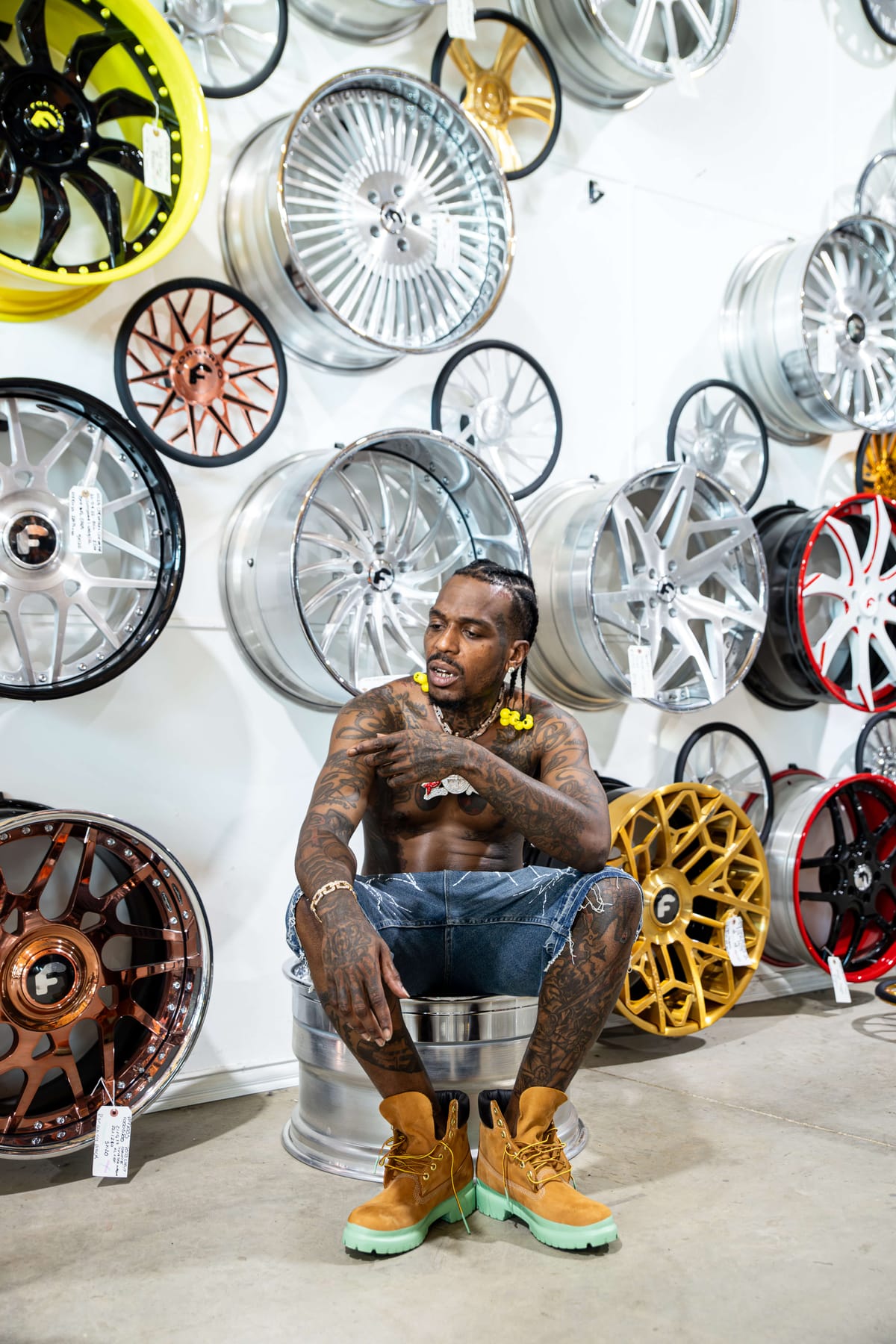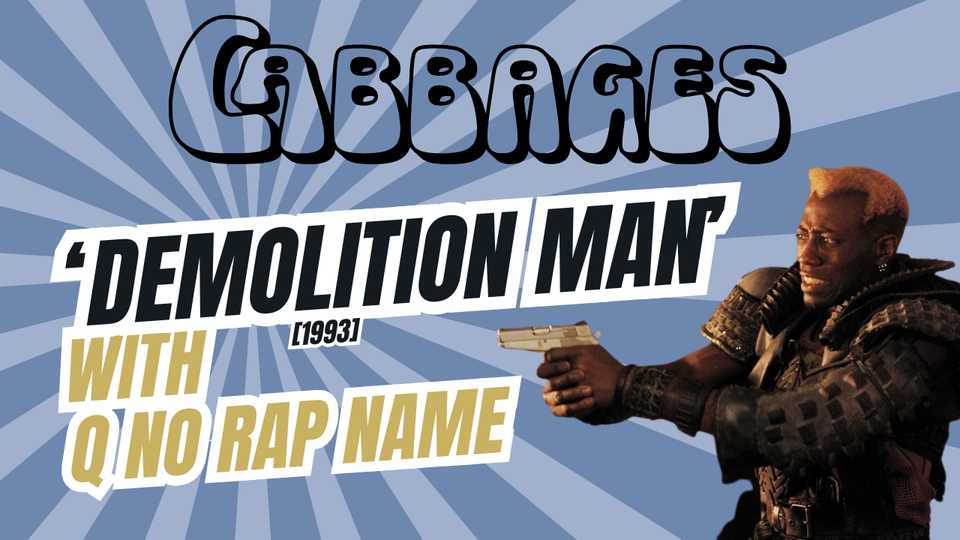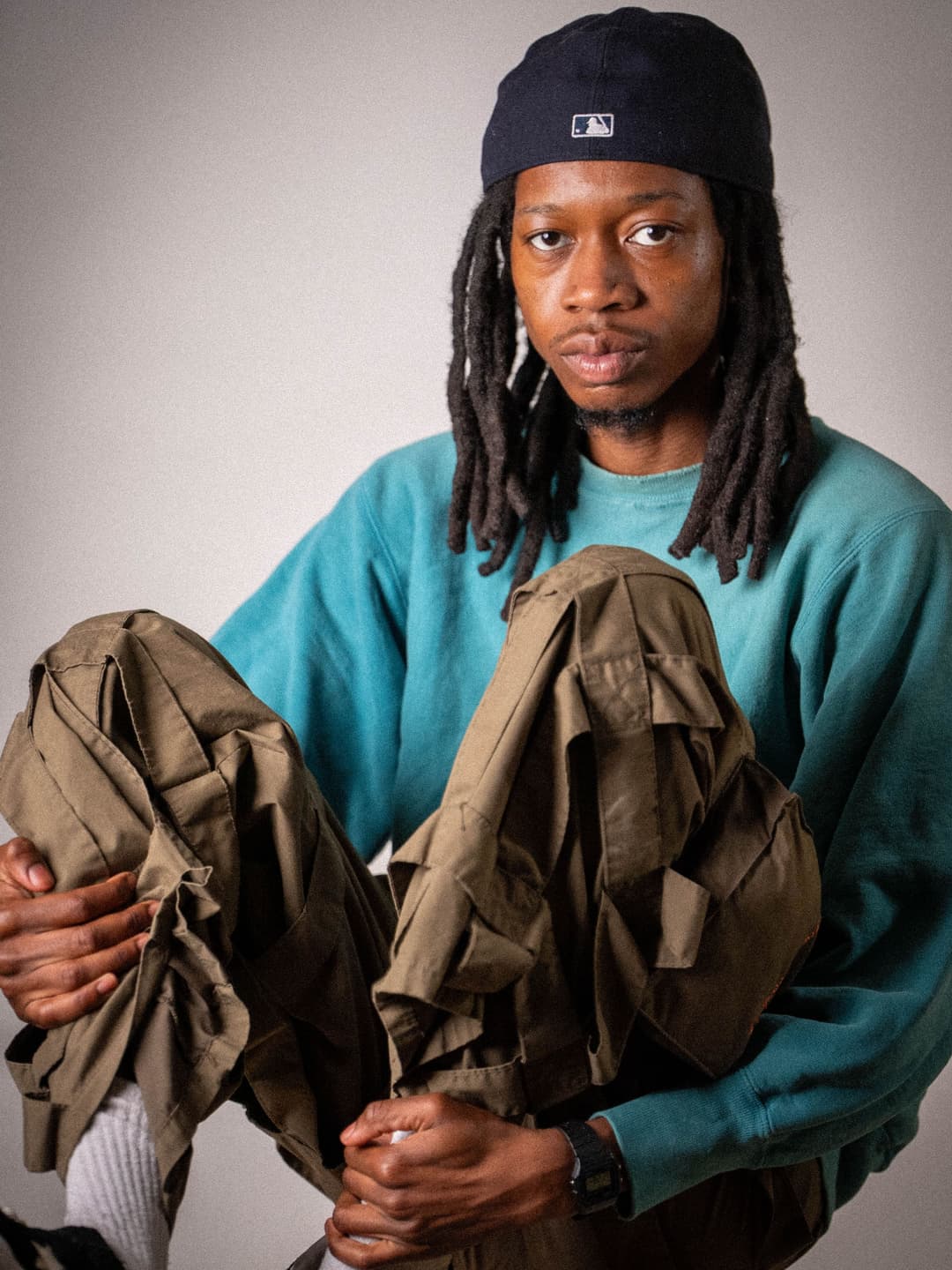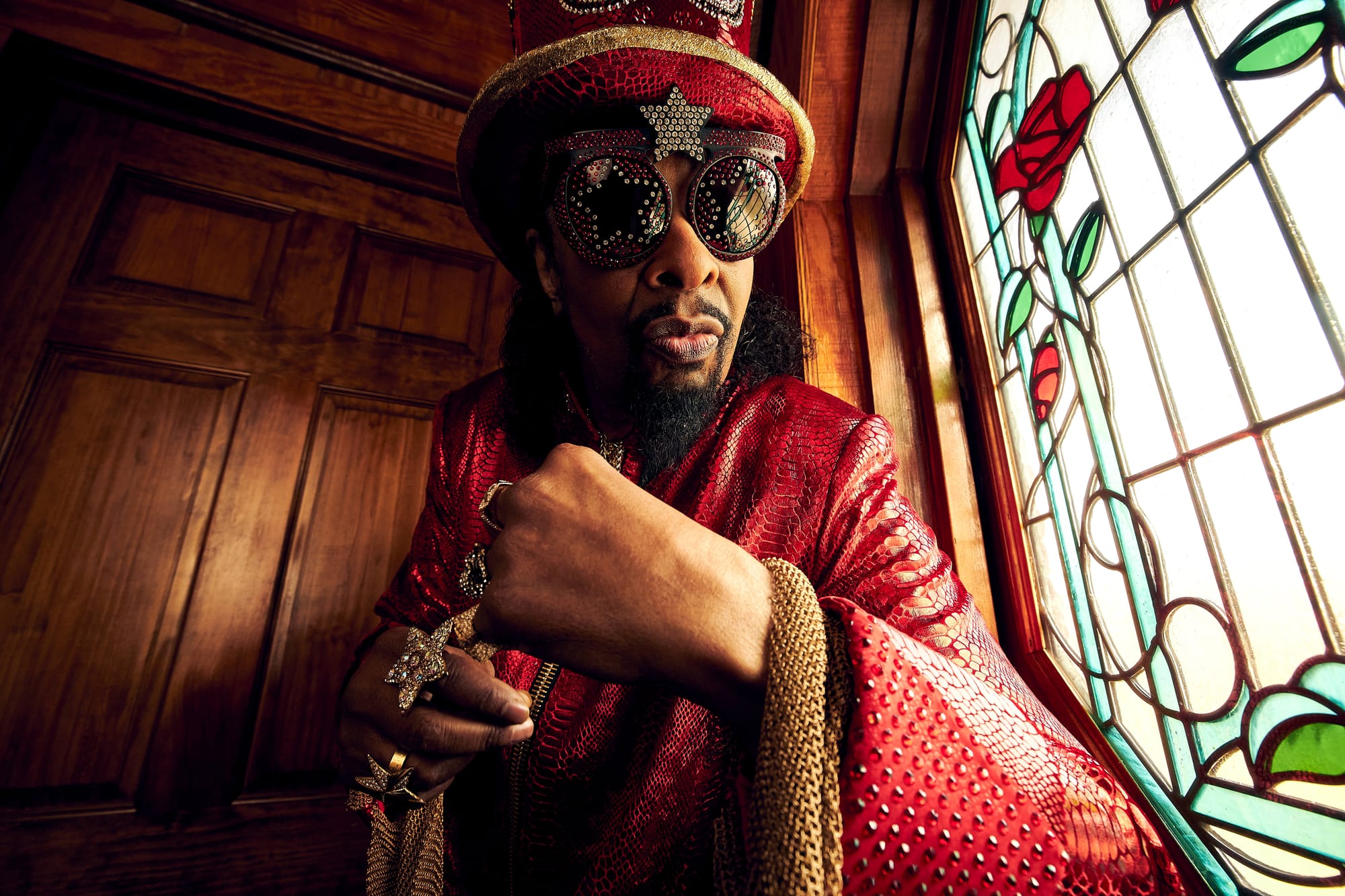Sauce Walka Goes For The G.O.A.T.
The Houston drip dynamo talks 'Saucefather 2.' +reviews of Fatboi Sharif x Duncecap and Rich Jones x SINAI.

In the five decades since hip-hop emerged in Bronx parks and rec centers, confidence remains a core characteristic of its participants. As necessary in emcee battles as in street skirmishes, the ability to effectively assert one's dominance hinges upon an outsized innate sense of self-worth. Untold scores of rappers purport to be nice on the mic, but those who say so with their whole chest while actually delivering on such promises belong to a special breed of artist: the G.O.A.T. contender.
"I'm one of the best lyrical rappers to ever live," Sauce Walka says within minutes of meeting me at a midtown Manhattan recording studio. "Quite frankly, the lyricism that I have is phenomenal and it's kind of second to none."
As opening act on Conway The Machine's U.S. tour last fall, the Houston rapper made it a point to demonstrate this in dramatic fashion. Back in September at New York's Webster Hall, the same venue where Raekwon once famously anointed Griselda with the Wu-Tang's blessing, he took to the stage with unbridled energy, performing physical feats along with musical stunts. The booming beats echoed the prevalent turn-up sound of hip-hop's vibrant South, as Walka bellowed his verses as if to emphasize the substance contained therein. (In conversation, he is quick to dismiss talk of him as a trap rapper, taking credit for "drip, splash, [and] sauce" as his distinct wave.) Even for those who recalled his feature alongside Boldy James and Stove God Cooks on Westside Gunn's "Westheimer," his dynamic set presented a marked vibe shift from what the arms-crossing, head-nodding audience may have expected.
Whether or not he converted new fans in the crowd, nobody could have possibly left the venue that night without a strong impression of Sauce Walka. "Sometimes club music doesn't always last as long as the lyrical music, as the hip hop cult music, but it can get you to money faster," he says. "But hey, eternity is always better than a weekend."
The future is definitely on his mind right now, though the present day looks especially bright as well. Saucefather 2, the sequel to his 2017 mixtape The Sauce Father that nodded to Gucci Mane's own The Oddfather, reflects a fresh high point in a prolific run of projects over the last decade. Coming of age amid national mainstream breakthroughs by now-legendary Houston acts like Mike Jones, Slim Thug, and Paul Wall, he's cognizant about becoming that sort of figure for a whole new generation of listeners, both in his city and beyond.
"One of the most significant–if not most important–parts to my legacy that equals legendary status is the route that I chose, choosing to be independent," Walka says. He notably rejected a deal with Roc Nation, a story the hip-hop tabloids amplified, and seems to have repeatedly rebuffed invitations from the major label machine despite the tempting lure of presumably large advances and a heavily staffed marketing/promotional apparatus.
"I've never had the graces of those weapons to be utilized for my sake," he says, "and I still surpassed 80-to-90% of the artists who came out at the time that I came out in the rap industry and had platinum records then." Acutely aware of how fleeting such success can be, he set goals different from those of the trend-hoppers and one-hit wonders out to make a quick buck. "That big song don't mean shit if you can't fill up a room right now with 2000 people 10 years later and still get paid."
Still, independence means investment, and raising funds and growing revenue streams is no small feat for any working artist. “You have to be able to create the capital, that's for sure," he says, assured after seeing his strategy pay off so well. "At the end of the day, music is business and music is worth money."
Walka's principled resistance to the industry's most powerful entities recalls the success strategies adopted by other enterprising and entrepreneurial people in the game like the late Young Dolph. This reflects in his stewardship of The Sauce Familia imprint, which includes the likes of Peso Peso and Rizzo Rizzo, the latter of whom features on Saucefather 2 highlight "Tweety." Imbued with Houston's hustler and go-getter spirit, he's inclined if not determined to go it alone, or at least keep his circle tight and his partnerships strategic for the mid-to-long terms. "At the same time, to be honest, that Texas way of thinking, going out the trunk, I’m really the last of a dying breed.”
Though accumulating wealth obviously factors into his motivations, Walka prides himself on working on his artistry, both in terms of lyricism and delivery. Throughout Saucefather 2, he executes verbal jabs and layered punchlines with seeming ease, fond of drawing upon sports heroes and celebs alike. Far from esoteric, his tracks contain repeated callouts to both broadly known and in-the-know brands alike, from the luxurious (Gucci, Rolls Royce) to the pharmaceutical (Quagen, Wockhardt). “Growing up, lyricism and bars was the thriving force of rap music,” he says, taking that to heart in his own work to try and set himself apart from the modern pack. “You can be a great storyteller with a great message, or a great entertainer and still be interesting, but the skill level is not there.”
On "Heath Ledger," he spits, this ain't Eddie Murphy lean, but it came from a professor around clever bars referencing Moneybagg Yo and Yella Beezy. When I cite this particular lyric, the athletic Walka stomps his feet and lifts himself off of the studio couch, his grill gleaming and eyes excitedly wide. "That is the epitome of the examples of what I'm talking about," he says with a grin. "If you actually listen to what's being said, a lot of the analogies that I use are not even triples; they're quadruples."
Naturally, that creative ethic also applies to his collaborations. When he links in the studio with other artists like Bossman Dlow or Travis Scott, both of whom appear on Saucefather 2, he relies on trusted insiders to advise him so as to maximize his impact on the track without overplaying his hand. For instance, while working with Lil Yachty on "Scratched My Rolls," the Motown x Quality Control hitmaker insisted that Walka jump back in after his second verse. "My friends and my artist brothers that's in the room, they were like, nah, fuck that shit. This song ain't about y'all out rapping each other," he says, ultimately agreeing with their take. "That's all we needed to be there."
Walka's evident respect for other hardworking and talented hip-hop artists only benefits his standing as he builds community with them. Among those he holds in high regard is The Alchemist. He vows that their long-anticipated collaborative project is both real and coming. "It's not a folk tale," he says, "but it was a process of friendly favors and love just reciprocated from both ends." Rather than dwell on the album's specifics he marvels aloud at the network he's become a part of as a result of their connection, mentioning names like ConductorWilliams, Earl Sweatshirt, and Harry Fraud with genuine admiration.
"The things that he's giving me to do or asking me to do, and also the information that he's putting out on Twitter to the people, it's helping my career massively."

Fatboi Sharif & Duncecap, Psychedelics Wrote The Bible (buy it / stream it)
No matter who Fatboi Sharif chooses to partner with, the results never fail to bewilder and unsettle. On the sacrilegiously dubbed Psychedelics Wrote the Bible, he links with his sometime Backwoodz Studioz mate Duncecap, who retreats from the mic to man the boards instead. Given his New Jersey-bred vocal collaborator's penchant for the bizarre, the producer pivots towards the unconventional with far-out instrumentals not entirely unlike his side work as depression naps. (Full disclosure: CABBAGES podcast host Jeff Laughlin put out a depression naps album earlier this year.) "Fetus" starts things off with fidgety piano and a plodding pace, making an ideal base for the steady stream of haunting non sequiturs. The unhinged aesthetic on "Boundaries Of Regret" and "Poor Man's Poetry" would alienate just about any rapper out there, though raspy guest SKECH185 adapts to this hip-hop microdose well with a masterful verse on "The Hours." As was the case with his recent Roper Williams reunion Something About Shirley, Sharif's second project of 2024 keeps its runtime fiendishly short. Still, by the time he creeps his way through the closing title track's old-timey monster movie score redux, the trip can be easily repeated.
Rich Jones & SINAI., Sour Dub (buy it / stream it)
Chicago's own Rich Jones delivers his bars with the sort of easygoing energy that one expects from stoner rap types. And while his latest album bears the 420-friendly title of Sour Dub, he's anything but one-note with his chosen subject matter. Yes, he fondly dreams of baggies past on the title track, but that initial premise serves to open a picturesque gateway into his couchlocked poetics. SINAI., a production alias employed by rapper Sleep Sinatra, joins his fellow Midwesterner for these head trips through bouts of bummer and resilience. With an instrumental evoking broken toys, "Joy Ride" saunters through gloom as the emcee seeks solace in spite of depressive episodes. He takes in deep breaths and exhales deeper thoughts for the low-fi funk excursion "Positive Vibes Only." Elsewhere, AJ Suede, J.U.S, and Qari join him for an eventful smoke sesh on the profound posse cut "Dream Blunt Formation."


Three new tracks for you to snack on...
CLBRKS & NickyDiesel, "Brucie Kibbutz"
Salimata, "TAKE YOU DEA"
070 Phi, "Hot Spliff"


![AMILES: The Radio Free Cabbages Interview [Video]](/content/images/size/w960/2025/04/a2769860291_10.jpg)


